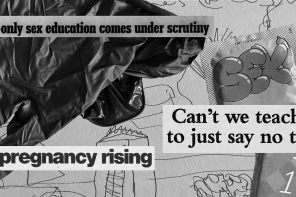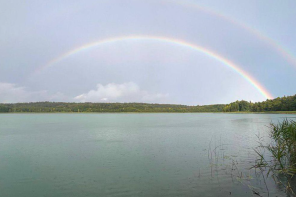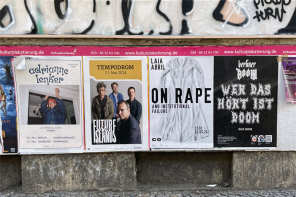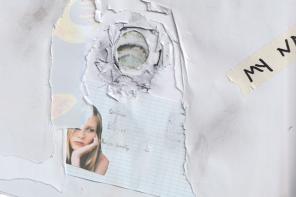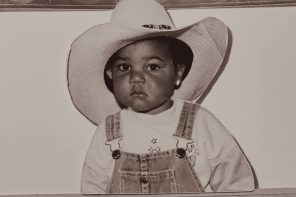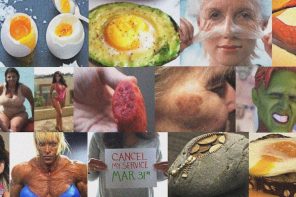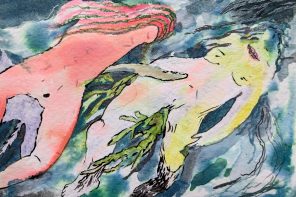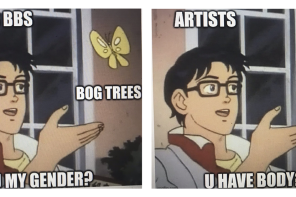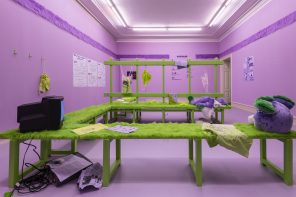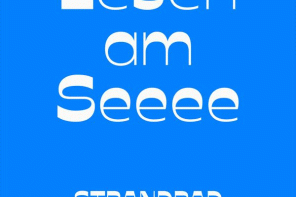Audio transcription:
Last year, for the first time in my life, I entertained the thought of having a child, and even becoming pregnant. During a conversation with my girlfriend, for a split second, I imagined the profoundly weird hair and mannerisms of our biological child. Cacophonic laughter, maybe.
Usually, I fantasize about tying my tubes as an act of asserting control over my body – a sentiment caused by growing up in a conservative, Catholic country. There is little to no sex-ed in Poland. Abortion is inaccessible. Tying tubes is illegal. Even getting the day-after pill is a hassle (it’s expensive, and one has to get a prescription from a gynecologist and usually pay for gyno visits, too). In Poland, unwanted pregnancy is a punishment for being too slutty, or not responsible enough. I don’t even know.
Convoluted catholic guilt aside, becoming pregnant always seemed inherently scary, inherently kinky, inherently discomforting. Inherently, well, gothic.
Fetal cells remodel a pregnant person’s arteries, limiting their control over blood flow to the placenta. E.W. Page described the latter as, “a ruthless parasitic organ existing solely for the maintenance and protection of the fetus, perhaps too often to the disregard of the maternal.” Maggie Nelson writes, after giving birth, “the baby will make it out alive, and so will you. Nonetheless, you will have touched death along the way. You will have realized that death will do you too, without fail and without mercy.” What is not mentioned enough postpartum, due to, I guess, the imperative of being happy with a newborn, is how frightening, trauma-inducing, and appalling labor can be.
During pregnancy, one’s body irrevocably changes to accommodate the parasitic being; it swells, stretches, leaks. While oxygen, nutrients, and antibodies suffuse from the gestator, foetal bodies float awkwardly inside a mix of water, electrolytes, fats, and piss. Those waste products later are disposed of by the child bearer’s liver, kidneys, and lungs. It’s all swamp-like. It seems like more of a body horror gore show than the miracle of nature. Quite scary.
My GF cannot conceive – her body is wombless – so it would be up to me to carry a pregnancy to term. On some level, I believe that my chronic depression would be locked into some twisted battle royal with postpartum depression. However, for a brief moment, the realities of being too poor, too precarious, too mentally unwell, and too afraid of the process paled in comparison to the face of child/biokin/chipmunk.
I’ve been told and even believed that bringing a child into a precarious uninhabitable world when you are poor is just cruel. Of course, it is hard to discard the notion that we are slowly burning on the increasingly hot planet. What will future kids do? Fight for street cred with nuclear waste-powered desert lizards? But these critiques can be quite classist and New York Times-y. Rarely are the rich asked not to reproduce. But why should mothering only be accessible to wealthy, white cis-women?
One can always dream about motherhood outside of repronormativity, maybe even fantasize about mothering. Approaching motherhood from the precarious margin denaturalizes it and showcases how symptomatic it is of broader social ills. Reproduction brings to light inequalities of time, money, kinship, healthcare, legal protection, and bodily integrity. It shows who is by default excluded from the child-having narratives of who will live a long and happy life and who won’t. Also, normative motherhood within the private family – the logical privatization of isolation and exploitation – is pretty sucky.
The current ghoulish zeitgeist is constructed so neither mothers nor families can thrive. What ‘pro family’ means in politics usually is connected to inheritance laws aimed at concentrating wealth in the hands of the few at the top of the world-class hierarchy. This normalizes unpaid labor, like motherhood. It conventionalizes racialized dimensions of social reproduction. It’s uncomfortably gendered. Elena Ferrante portrayed motherhood as “a substance to allow two greedy bloodsuckers to nourish themselves.” It seems so unbelievably lonely.
Gestating is work, and it is often extremely challenging and hazardous work. When I write about the horridness of labor or motherhood, it’s not because I don’t appreciate gestational labor. Those who decide to mother others are usually overworked and put under terrible scrutiny over the tiniest decisions regarding their dependents. But I think reproductive labor should be more accessible, more enjoyable, and decisively non-lethal. We deserve better.
So instead, what would mothering be? Mothering, as I would like to perceive it, has traits of almost unattainable utopian futurity, but it is also just about care. This particular fantasy involves communities, kin-making, egalitarian possibilities, camaraderie against the nuclear family, the kindness of intimates and strangers. Treating children as equals. Relationships of love and solace. It’s a dream of compassion, respect, friendship, and love. In the 80s, the Sisterhood of Black Single Mothers described “fatherless” families as “motherful” instead. It seems all kinds of wonderful to imagine a world where relationships of care will replace biological kinship. Instead of the loneliness of a single-family unit, an extensive network of others.
I don’t think I want to have a bio baby on my own, but I would like to help others with mothering. Wouldn’t it be dreamy to live more communally? To help each other more with reproductive labor, fostering relationships and friendships. Mothering or just caring for another being could be a way of enacting hope in the future – a reminder that we depend on each other. For now, though, I would like to mother two bunnies. We could love each other very much.
Words by Olga Tyszkiewicz
Image by Anna Maria Łuczak
Olga Tyszkiewicz is a precarious person living in Berlin. Beyond that, she wishes to be a person taking their pet for a walk in a 7 inch platform heel at 9am.

